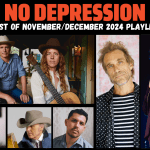Jesse Winchester – An Appreciation
Five Years ago I had the pleasure of talking with legendary singer-songwriter, Jesse Winchester. Our conversation was beyond pleasant. We connected and found a great time of laughter together. I’m still no veteran when it comes to interviewing artists, especially those I admire. But in 2009, I was just plain green. He was kind, funny, open and self-effacing about his own legacy.
Jesse Winchester and especially his first self-titled album held a similar mystique as The Band. That cover photo had him looking like a lost member of the James-Younger gang. I played “Yankee Lady” endlessly and whatever it is that we call Americana today, unfolded before me like a great American quilt. His career included several fine albums and international tours. He was a major American songwriter who helped to create the template many artists work from today. As a Southerner who met The Band’s Robbie Robertson in Canada, he embodied what Robertson and crew were trying to capture. He did so with grace, ease and an inspiring and easy-going unpretentious humility.
While he left the country in the late 60’s rather than serve in the Vietnam War, in the interview that follows, when asked about this time in his life, he said something that defined his character and his artistry. “One thing I learned is the choices you made in your youth don’t matter as much as how you live with the consequences.” This is a lesson few of us ever really learn. Winchester did. He grew up from there and made a life and career that showed his love for music, his peers, friends, family and country.
I wish his family and friends well as they remember him this week and especially as they feel his loss in the weeks, months and years to come. In the 2009 interview that follows, my first ever submission to No Depression, Jesse states his favorite song is “Stand By Me.” The video and previously published interview that follows is for Jesse Winchester, his family, fans and friends….from this side of the veil. God bless.
The following article was originally published in San Diego Troubadour and cross published in No Depression in 2009.

Born in Virginia and raised in Mississippi, he absorbed the music of the earth where he was raised. In 1967, after receiving draft notification to report for duty with a strong possibility of being sent to Vietnam, Winchester fled to Canada. Ironically, it was then that his muse began to sing and his original songs came up from him like a natural wellspring. He was found by Robbie Robertson in time to be considered an important contributor to the singer-songwriter movement of the ’70s. His songs would be recorded by Crystal Gayle (“Mississippi on My Mind”), Patti Page, Elvis Costello, the O’Kanes, and Jimmy Buffett. Over four decades his solo career has produced a steady flow of music as good as any of the best of the more well-known artists of our time. Since the ’70s he has returned to the American South, now living in Virginia. His latest release, Love Filling Station, pays tribute to the romance of the music from the ’50s. I recently spoke with him about his music, career, Vietnam, and even what may lie behind the veil.
TR: Well, let me first say what an honor it is to do this interview. I cherished my copy of your first album, the one with “Yankee Lady.” It helped me through some of those tough teenage times.
Jesse Winchester: Well, thank you. Its nice to hear that.
TR: I wanted to start with your association with the Band. I’m unclear. Were you a member of the Band?
JW: No, I wasn’t. I was working on a demo in the basement of a church. A friend of a friend passed a copy to Robbie Robertson. Then it went to Albert Grossman who signed me to a contract. My association with them went as far as opening a few shows for them. But, I still communicate with Levon once in awhile.
TR: One of the things I remember about that first album was that the Band was on it. I remember Garth Hudson and Levon.
JW: Yeah, Levon played mando [laughs]. But Richard and Rick weren’t on it. At the time, I think the group felt kind of bad because they were being thought of as this group of guys who made this great music in the basement of Big Pink. But, really, Music From Big Pink was made in a New York studio. When it came to me, Robbie said, ‘Let’s really do it with an old fashioned sound.’ They wanted to do it live with no overdubs to speak of. But I didn’t go back to see how it was being done. Todd Rundgren was the engineer, so it’s hard to believe they weren’t using some kind of gizmos.
TR: I remember, not long after that, you recorded this song that became a hit….what was it? “First Rate Romance”?
JW: [laughs] No, it was “Third Rate Romance.”
TR: Sorry, my memory is bad.
JW: It was written by Russell Smith. At the time my band was called the Rhythm Aces. Two of the guys took the song and they became the Amazing Rhythm Aces. They had a hit with that song.
TR: Tell me about how you started.
JW: Well, my parents gave me music lessons when I was a kid. I played organ in church, but nothing connected until I heard a Memphis radio station. I heard blues, rockabilly, and connected with that.
TR: What about the songwriting?
JW: When I got to Quebec I was mostly playing in bar bands. I had a series of jobs. There was a lot of the work was for solo artists in coffee houses. You were expected to write your own songs.
TR: What was the music scene like in Canada?
JW: One thing a lot people in the U.S. don’t understand is there’s the more English influenced part of Canada and also the French areas. The French are into a different kind of thing with a strong European influence like Edith Piaf. We had those things in Quebec. A kind of cabaret tradition. It was a lot about style. The English side had folk singers like [Ian] Tyson, but where I came from, it was a different world. I recorded a song in French and I kind of speak French [laughs].
TR: Tell me about your experience with the draft and moving to Canada.
JW: Well, I didn’t see going to a war I didn’t believe was just or dying for it. At the time I didn’t want to discuss it. I didn’t think about it, I just said, “I’m going,” and I left.
TR: So, was that out of courage?
JW: No, I can’t say that.
TR: Conviction?
JW: I don’t think so. At the time, it was hard to tell what was right. It’s still hard to tell. One thing I learned is the choices you made in your youth don’t matter as much as how you live with the consequences. God doesn’t tell us who is right. So, you have to speak honestly.
TR: Speaking of spirituality, you mentioned something about “behind the veil.” Do you have any insight about that?
JW: [laughs so hard, the phone nearly flies out of my hand] No I can’t say that I have. I’m not that insightful!!
TR: Well, I thought I’d ask. You never know who might have the answers!
[We both laugh some more]
TR: Okay, I knew it was a stupid question as soon as it came flying out of my mouth [we both laugh…in a hooting and hollering sort of way]. I’d like to review some of your essential songs for any comments or stories you may have to tell.
JW: Okay.
TR: How about “Brand New Tennessee Waltz”?
JW: That was the first song I wrote. The lyrics are cryptic. I don’t write that way anymore. My writing is usually clear.
TR: How about “Black Dog”?
JW: It’s another one that’s different for me. It’s about evil.
TR: “Denying Gravity”?
JW: It’s a spiritual song … I don’t really like commenting on my songs. I think the listener brings their own meaning because of their experience. Telling my experience may get in the way of that.
TR: Any favorites?
JW:Yes. I really love “Sham-Along-Dong-Ding.” Its a tribute to the ’50s doo wop music. The new album, Love Filling Station, draws a lot from that era. I recorded “Stand By Me,” which is my favorite song.
TR: As a songwriter, do you see yourself as a storyteller?
JW: Not really. I’d see myself as more of a craftsman because songwriting is more about craft.
TR: Like Guy Clark.
JW: Yeah. Guy’s a craftsman. He’s even got his own guitar workshop down there in Texas. I would like to say I stand in the tradition of great songwriters like Ira Gershwin and Stephen Foster rather than a storyteller.





